Related Research Articles

The Great Famine, also known as the Great Hunger, the Famine and the Irish Potato Famine, was a period of starvation and disease in Ireland lasting from 1845 to 1852 that constituted a historical social crisis and subsequently had a major impact on Irish society and history as a whole. The most severely affected areas were in the western and southern parts of Ireland—where the Irish language was dominant—and hence the period was contemporaneously known in Irish as an Drochshaol, which literally translates to "the bad life" and loosely translates to "the hard times". The worst year of the famine was 1847, which became known as "Black '47". During the Great Hunger, roughly 1 million people died and more than 1 million more fled the country, causing the country's population to fall by 20–25% between 1841 and 1871. Between 1845 and 1855, at least 2.1 million people left Ireland, primarily on packet ships but also on steamboats and barques—one of the greatest exoduses from a single island in history.

Sir Robert Peel, 2nd Baronet,, was a British Conservative statesman who served twice as Prime Minister of the United Kingdom, simultaneously serving as Chancellor of the Exchequer (1834–1835), and twice as Home Secretary. He is regarded as the father of modern British policing, owing to his founding of the Metropolitan Police Service. Peel was one of the founders of the modern Conservative Party.
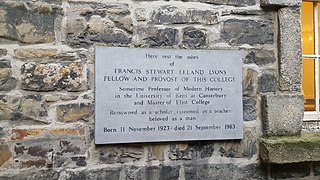
Francis Stewart Leland Lyons was an Irish historian and academic who served as the 40th Provost of Trinity College Dublin from 1974 to 1981.

George William Frederick Villiers, 4th Earl of Clarendon, was an English diplomat and statesman from the Villiers family. Following diplomatic postings, he served a succession of Whig and Liberal administrations. This included as Viceroy in famine-stricken Ireland and, on the first of three occasions as Foreign Secretary, as the United Kingdom's chief representative at the Congress of Paris which ended the Crimean War.

Charles Wood, 1st Viscount Halifax, known as Sir Charles Wood, 3rd Baronet, between 1846 and 1866, was a British Whig politician and Member of the British Parliament. He served as Chancellor of the Exchequer from 1846 to 1852.
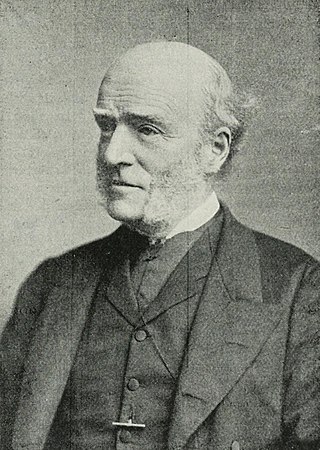
Thomas Hughes was an English lawyer, judge, politician and author. He is most famous for his novel Tom Brown's School Days (1857), a semi-autobiographical work set at Rugby School, which Hughes had attended. It had a lesser-known sequel, Tom Brown at Oxford (1861).

Edward Robert Lytton Bulwer-Lytton, 1st Earl of Lytton, was an English statesman, Conservative politician and poet who used the pseudonym Owen Meredith. During his tenure as Viceroy of India between 1876 and 1880, Queen Victoria was proclaimed Empress of India. He served as British Ambassador to France from 1887 to 1891.

Robert Bourke, 1st Baron Connemara, was a British Conservative politician and colonial administrator who served as Under-Secretary of State for Foreign Affairs and Governor of Madras (1886–90).

Sir Charles Edward Trevelyan, 1st Baronet, was a British civil servant and colonial administrator. As a young man, he worked with the colonial government in Calcutta, India. He returned to Britain and took up the post of Assistant Secretary to the Treasury. During this time he was responsible for facilitating the government's response to the Great Famine in Ireland. In the late 1850s and 1860s he served there in senior-level appointments. Trevelyan was instrumental in the process of reforming the British Civil Service in the 1850s.
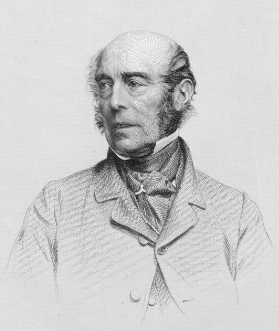
Ulick John de Burgh, 1st Marquess of Clanricarde, styled Lord Dunkellin until 1808 and the Earl of Clanricarde from 1808 until 1825, was a British Whig politician who served as British Ambassador to Russia (1838–40), Postmaster General (1846–52) and Lord Keeper of the Privy Seal (1858).
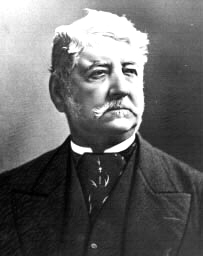
Sir Arthur Edward Kennedy was a British colonial administrator who served as governor of a number of British colonies, namely Sierra Leone, Western Australia, Vancouver Island, Hong Kong and Queensland.
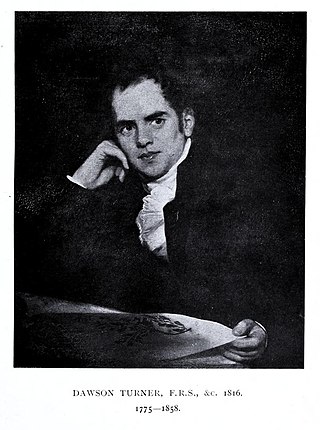
Dawson Turner was an English banker, botanist and antiquary. He specialized in the botany of cryptogams and was the father-in-law of the botanist William Jackson Hooker and of the historian Francis Palgrave.
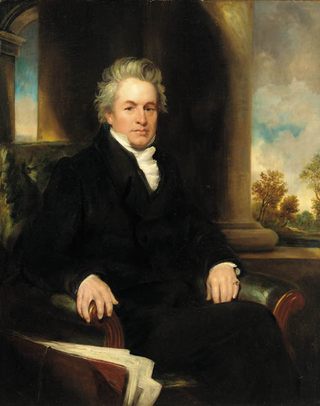
Pascoe Grenfell was a British businessman and politician.
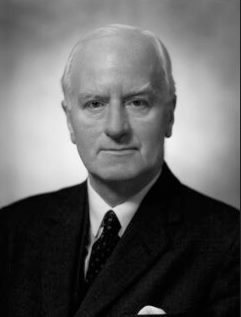
Sir Ernest Bullock (1890–1979) was an English organist, composer, and teacher. He was organist of Exeter Cathedral from 1917 to 1928 and of Westminster Abbey from 1928 to 1941. In the latter post he was jointly responsible for the music at the coronation of George VI in 1937.
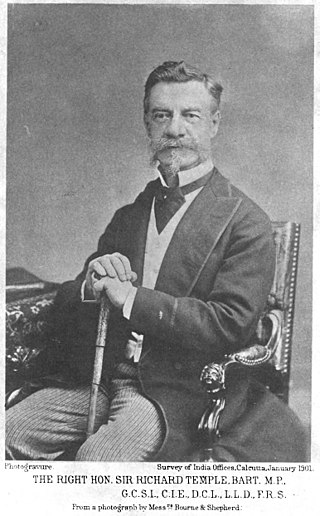
Sir Richard Temple, 1st Baronet, was a British colonial administrator in the 19th-century India, who served as Governor of Bombay from 1877 to 1880.
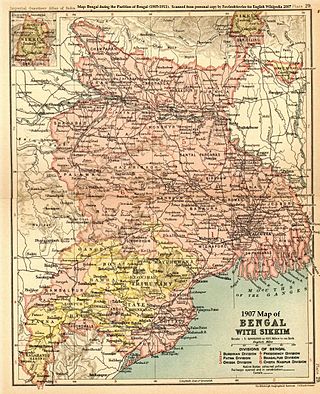
The Bihar famine of 1873–1874 was a famine in British India that followed a drought in the province of Bihar, the neighboring provinces of Bengal, the North-Western Provinces and Oudh. It affected an area of 140,000 square kilometres (54,000 sq mi) and a population of 21.5 million. The relief effort—organized by Sir Richard Temple, the newly appointed Lieutenant-Governor of Bengal—was one of the success stories of the famine relief in British India; there was little or no mortality during the famine.

The Hon. Thomas James Twisleton (1770–1824) was an English churchman, Archdeacon of Colombo from 1815 to 1824. His early marriage has been considered a contribution to the use by Jane Austen of amateur theatricals as a plot device in her novel Mansfield Park. He was also noted as an amateur cricketer.
General Charles Rainsford was a British Army officer.

Charles Theodosius Heath was a British engraver, currency and stamp printer, book publisher and illustrator.

George Twisleton, 1618 to 12 May 1667, was a member of the landed gentry from Yorkshire and colonel in the Parliamentarian army during the Wars of the Three Kingdoms. Under the Commonwealth of England, he sat as MP for Anglesey from 1654 to 1659.
References
- ↑ Dictionary of Irish Biography. https://doi.org/10.3318/dib.008688.v1 Retrieved 14 October 2023.
- ↑ Read, Charles (2022). The Great Famine in Ireland and Britain's financial crisis. Woodbridge. pp. 193–196. ISBN 978-1-80010-627-7. OCLC 1365041253.
{{cite book}}: CS1 maint: location missing publisher (link) - ↑ GILLISSEN Christophe. (2014/3). 'A United Kingdom? Ireland, the Union, and Government Responses to the Great Famine', Études anglaises, pp. 332–347.
- ↑ Curthoys, M. C. "Twisleton, Edward Turner Boyd (1809–1874)". Oxford Dictionary of National Biography (online ed.). Oxford University Press. doi:10.1093/ref:odnb/27915.(Subscription or UK public library membership required.)